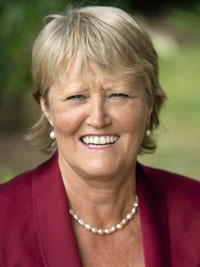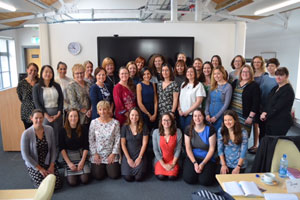Professor Dame Sue Hill is the Chief Scientific Officer for England, providing expert clinical scientific advice across the health system and serving as head of profession for the healthcare science workforce in the NHS and associated bodies, embracing more than 50 separate scientific specialisms. Sue is the Senior Responsible Officer for Genomics in NHS England, leading developments in this area, having previously established the NHS Genomic Medicine Centres and led the NHS contribution to the 100,000 Genomes Project. She is a respiratory scientist by background with an international academic and clinical research reputation.

“I have always been a cheerleader for everyone in healthcare science – both as a leader, and as a role model in my endeavour to support women’s careers – balancing personal priorities against a rigid corporate structure can certainly be an obstacle to a woman’s success in science and medicine.”
Cooperation, collaboration and community spirit
From a very young age, I always wanted to understand how things worked. As a child I was logical and analytical, and constantly asking questions. I was an aspiring athlete as a teenager, encouraged by a former Olympic athlete schoolteacher.
As a keen sports player, I believe I learned the values of cooperation, collaboration, community spirit, and “doing things for the greater good”. I have always been a team player, and always strived to succeed.
For me, it was a relatively easy step from academia into a career as a respiratory scientist. I have always been passionate about research. My PhD, which I did at the University of Birmingham, was in respiratory science.
I began working with professional clinical bodies in the 1980s, and joined the Department of Health as Chief Scientific Officer for England in 2002 after developing the UK’s first-ever National Occupational Standards for healthcare science spanning the whole career framework and over 50 different specialist areas.
I helped devise and led the Modernising Scientific Careers programme building upon the national occupational standards project to develop education and training programmes and the infrastructure for delivery amongst many other transformational programmes in diagnostics and in respiratory medicine.
I am proud to say I introduced parity for science-based teams in the NHS, which helped staff to self-identify as being part of a distinct group in the service – the healthcare science workforce.
My personal mission is to champion our healthcare scientists in the NHS, ensuring that our science-based workforce is rightfully acknowledged as a vital part of the health and care service in this country. I also need to make sure that they continue to receive the resources to upskill, improve and transform services.
As Chief Scientific Officer for England, I work across the health and care system, collaborating and coordinating our science-led services with organisations such as NICE, the MHRA, Health Education England, Public Health England (now UKHSA) and, the NHS Blood and Transplant service.
Health and care evolution and transformation
My role is certainly busy and no two days are ever the same! My overarching role is to ensure our health and care services continue to evolve and transform, using advances in technology and emerging science to deliver benefits to patients.
Part of this is ensuring that all health and care staff have the skills they need to use new technologies. This means a lot of meetings across the NHS and with professional bodies, charities and with industry.
I am particularly proud of having been able to establish the National School for Healthcare Science, which has just celebrated its 10th birthday and the Academy of Healthcare Science (AHCS). Both organisations have recruitment, regulation, and education of healthcare scientists at the core of their purpose.
As I am the senior person in the NHS for genomics and its implementation, a lot of my day is taken up with driving forward our world-leading Genomic Medicine Service, which builds upon the NHS contribution to the 100,000 Genomes Project that I led.
I also lead several other workstreams and liaise with the Chief Scientific Advisers across the four nations.
COVID-19 and beyond
At the beginning of the pandemic, I was asked to work in my cross-cutting take on Chief Scientific Officer for England in the UK Government’s NHS Test and Trace programme, overseeing the introduction and deployment of new testing technologies, validation and regulatory compliance and quality assurance inclusive of co-directing the COVID-19 genome sequencing programme.
Colleagues across the NHS continue to work incredibly hard to deal with current pressures, tackle backlogs, and deliver on our long-term goals of improving treatment, care, and outcomes.
I believe the NHS needs to continue showing the same innovative approach and ‘can do’ spirit in tackling the backlogs as it has throughout the pandemic, and apply the lessons of the vaccination programme, particularly around using data and digital innovations. Healthcare scientists are particularly involved in finding new ways to deliver the tests and scans people need through Community Diagnostic Centres.
Harnessing the power of genomics: Diagnose, predict, help, treat, prevent
Genomics uses knowledge about a person’s DNA along with information about their health condition to diagnose, predict, help, treat, and also prevent disease in a way that is tailored to that individual. It uses high-speed computing to compare a person’s health and sequence data (the read out of their DNA’s special code) with thousands or even tens of thousands of other people’s, in order to interpret the information correctly.
Genomics will allow us to move away from a one size fits all treatment to a personalised medicine approach. This means getting the right and most effective treatment first time — it’s very exciting!
The UK is recognised worldwide as a leader in genomics and the unique structure of the NHS is allowing us to deliver these advances at scale and pace for patient benefit through the NHS Genomic Medicine Service, the first time in the world that any health system has done this.
A good example is diabetes. People may seem to have the same symptoms but actually the causes of their diabetes may be different and need different types of treatment to be resolved. Genomics can identify this quickly and successfully.
Whole genome sequencing
On the treatment side, we are rolling out whole genome sequencing (where the entire DNA of the genome is ‘read’) for all children with cancer, and we trying to ensure that adults with cancer are routinely offered genomic testing. Their cancer’s genome will have a different sequence to that of their healthy cells and gives us clues as to how to treat it most effectively. Comparing healthy and cancer sequences also shows what might have been inherited that is contributing to the cancer.
In 2017, during the recruitment phase of the 100,000 Genomes Project, I was diagnosed with breast cancer. I took the opportunity to directly contribute to the project by donating my own data, so that it could be used not just for me, but for other people with the same condition, or for people in the future.
A key part of genomics is that we continually feed information from patients, clinicians, and genomic testing back through the research process before returning it back into the NHS, so benefiting us all, and feeding this revolutionary approach to health data back into the NHS.
Importance of diversity of thought in science and medicine
While more than four-fifths of NHS staff feel their organisation acts fairly with career progression and the number of women and people from Black and minority ethnic backgrounds in senior surgical roles is increasing, there is more work to do.
A career in the NHS in science is rewarding, diverse, and enables people to really make a difference, but, as a healthcare scientist, I also like evidence.
Fortunately, there is a great deal that shows that where an NHS workforce is diverse and representative of the community it serves, patient care, productivity, and the overall experience for patients and staff improves. To make the NHS the best place to work, we need a strong, compassionate, and inclusive culture that values our people and creates a sense of belonging.

I commissioned a report on Equality, Diversity, and Inclusivity in the Healthcare Science workforce, and we have undertaken an evaluation of our current leadership programme offers.
How we increase the enrolment of women from disadvantaged or under-represented backgrounds is a key line of enquiry, and I believe it is a bittersweet thing to admit that this ambitious work has never been attempted before in healthcare science.
Removing obstacles to success in healthcare science
I have always been a cheerleader for everyone in healthcare science – both as a leader, and as a role model in my endeavour to support women’s careers – balancing personal priorities against a rigid corporate structure can certainly be an obstacle to a woman’s success in science and medicine.
Yet the NHS offers fantastic parental support for our staff, such as flexible working patterns, and paternity leave.
It is so important that women have the skills and resources they need to compete, that we identify the rising stars in our profession, and that we have the best leadership training to empower women to step-up, take on broader roles, and to be part of succession planning.
In order to promote greater interest in science and medicine for girls and women, we need more role models. We live in aspirational times, and I believe there are some fantastic women working in STEM who can catalyse a new generation of women who will lead medical science into the future.

Part of my role includes sponsoring academic Fellowships, such as the WISE Fellowship for NHS England, which started in 2016, which offers professional leadership coaching to support women in healthcare science to achieve their career goals. I also established the WISE senior leadership ambassador programme to bring the wisdom and knowledge of senior leaders in science together to drive forward initiatives and projects
Coming up next
I am looking forward to returning to some level of normalcy. We have been separated from each other for so many months – no one has escaped the impact of this terrible virus.
So, I am excited to see all my colleagues, peers, and friends again in person and to celebrating their extraordinary achievements during this, the most challenging time of our lives. We have an opportunity to reflect on what we have lost, on what we should stop doing, and what we have changed for the better.
Healthcare scientists are not used to being in the spotlight, but because of the pandemic, it is now shining on them like never before. I am eager to build on this momentum and ensure the public understands that this profession is as important as GPs, nurses, and clinicians.
https://www.england.nhs.uk/author/professor-sue-hill/





